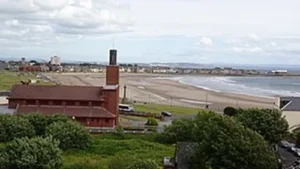In August 1968, the UK government sent troops to occupy Northern Ireland, in an effort to quash rioting and discrimination against the Catholic minority by the Protestant majority. I was 11 years old, playing on a hill, in a town called Ardrossan, on the west coast of Scotland. Ardrossan had a well-established ferry service to Belfast in Northern Ireland.
To my jaw-dropping amazement, my play was interrupted by the thunderous roar of tanks tearing on to the hill, and ripping-up the grass as they raced to the peak, and parked in a line looking out to the sea. In the meantime, there were armoured cars, jeeps and trucks parking in the available streets in the centre of a town that had a population of 5,000 people. And there were additional ‘amphibious’ vehicles, taking-up position on the beach.
Being 11 years old, I had little clue of what was going on, but being curious children, my friends and I wanted to know everything. Word soon spread that these were the first of the troops headed to Northern Ireland, but the ferry was delayed, and not ready to take on all the army vehicles heading there.
As the army vehicles were going to be delayed for some time, they were opening some of the vehicles up to us local children to climb inside. And best of all, they were driving us into the sea, and out again, to go tearing along the hard sand. As children, we had a whale of a time, poking, prodding, asking endless questions, and getting very few of them answered.
Eventually, and much to our great disappointment, we were chased away, and that army convoy went on to their destination, little knowing that British troops would remain in Northern Ireland for the next thirty years.
It is amazing to think, now, that it was the Catholic minority who asked for the troops, but they soon decided that it had been a disastrous thing to have happened as, from their perspective, the troops had made things much worse.
In the meantime, back in Ardrossan, there were more ferry trips, but not for long. The ferry company began to get a phone call every single time the ferry was leaving the harbour, saying that there was a bomb on board. Security protocols demanded that the ferry return to the harbour. Every vehicle and passenger had to disembark, and the ship and all non-military vehicles had to be searched. No bomb was ever found, but the ferry had to stop operating for obvious reasons, as the same thing happened day after day after day.
Over half a century later, Northern Ireland continues to operate in an environment of ongoing mistrust and uneasy peace, rocked somewhat by fall-out from Brexit. There have been many bombs, shootings, murders and recriminations over the years that started, for me, as an exciting trip into the sea in an amphibious vehicle. All these events were a very real part of UK history, but rarely talked about in detail, outside of Northern Ireland, except on the occasions where bombings took place on the British mainland.
The challenges remain there, particularly in the operation of the devolved government, but hopefully the solutions will remain in the political arena, with no further resort to violence on the streets and in the communities.
Fraser
March 2024
